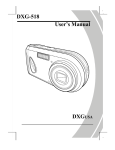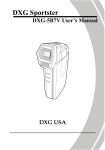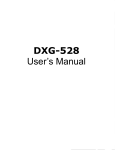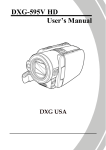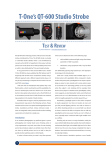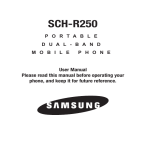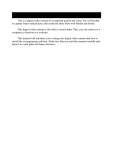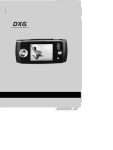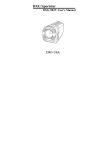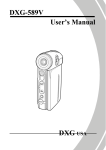Download DXG Technology DXG-608 Digital Camera User Manual
Transcript
DXG-608 User’s Manual DXGUSA Preface Congratulations on your purchase of this advanced digital camera. Make sure that you read this manual carefully and keep it in a safe place for future reference. About this manual Every effort has been made to ensure that the contents of this manual are correct and up to date. However, no guarantee is made regarding the accuracy of the contents. If the contents of this manual do not tally with the camera, please take the camera as a criterion. DXG reserves the right to change the contents of this manual or the technical specifications of the camera without prior notification. If the accessories do not tally with the actual package, please take the actual package as the criterion. Copyright © Copyright 2005. All rights reserved. No part of this publication may be reproduced, translated into any language or computer language, in any form or by any means, electronic, mechanical, magnetic, optical, chemical, manual or otherwise, without the prior written permission of the manufacturer. 1 Safety •When using Li-ion batteries in this product, ensure that they are inserted correctly. Inserting the batteries improperly can cause damage to the product and possibly start a fire. •Use only the type of battery and charger that came with your camera. Using any other type of battery or charger may damage the equipment and invalidate the warranty. •Do not use or store the product in dusty, dirty, or sandy areas, as its components may be damaged. •Do not store the product in hot areas. High temperatures can shorten the life of electronic devices, damage batteries and warp or melt certain plastics. •Do not store the product in cold areas. When the product warms up to its normal temperature, moisture can form inside and may damage the electronic circuits. •Do not attempt to open the casing. •Do not drop or knock the product. Rough handing may damage the internal components. •Do not use harsh chemicals, cleaning solvents or strong detergents to clean the product. Wipe the camera lightly with a damp soft cloth. •If the product or any of its accessories are not working properly, take them to your nearest qualified service center. The personnel there will assist you, and if necessary, arrange for the product to be repaired. 2 Table of contents Preface About this manual .......................................…......…..........1 Copyright..................................................…..........…….…1 Safety ...........................................................….…....…......2 Introducing the camera System requirements ......................................….……........7 Features ........................................................…......…..…...7 Unpacking ...................................................……..…..........8 About the camera ...........................................……….........9 Front view .......................................................………....9 Top View .......................................................………....10 Back view ...............…......................................………10 Getting started Charging the battery .........................................……….....11 Inserting the battery .......................................……….......12 Inserting an SD card .......................................………......13 Turning on for the first time ........................……….....…14 Before you start ................................................……….....14 Setting the date and time ..........................………….....14 Setting the beep function ............................………......15 Setting the language .............................………….........17 Changing modes ............................................………….......18 Taking your first still picture .........................………….......19 3 Shooting your first video ..............................…………........19 Connecting .....................................................………….......20 Connecting to a TV ...............................…………............20 Connecting to a computer .............................……………21 Using the camera Using the camera buttons ..........................………............22 Using the camera LCD display ........................……….....24 Changing the LCD display. .....................………..........24 Shutter priority mode ........................................................27 Using shutter priority mode ..........................…............27 Icons ...................................................……...................28 Flash ..............................................................………....30 Macro .......................................................……….........31 Zoom .......................................................……..............31 Menu options ..............................................………......32 Auto Mode ......................................…………………......33 Using auto mode ......................…………………….....33 Icons ...............................................................…….......33 Flash .............................................................…….........35 Macro ............................................................……........35 Zoom ...............................................................……......35 Menu options .............................................……….......35 Manual mode ................................................……............36 Using auto mode .......................................………........36 Icons ........................................................………..........36 Flash ..............................................................……........38 Macro .........................................................……...........38 Zoom ..........................................................……...........38 Menu options ..............................................………......38 Scene mode ......................................................…….........42 Using scene mode ........................................……….....42 4 Icons .................................................................……....42 Scenes ............................................................……......44 Zoom ...........................................................…….........45 Menu options ..............................................………......45 Setup ..............................................................……..........46 Date/time ....................................................………......46 Insert date ......................................................………...46 Format .........................................................………......46 Power saving .................................................………....47 Beep vol ........................................................……........47 Shutter vol ...................................................………......47 Start Screen ..................................................……….....48 Rec review .................................................……….......48 Language ....................................................……..........49 Reset ................................................................…….....49 Frequency .....................................................………....49 TV out ...........................................................……........50 Connect ............................................................…….........50 Using connect mode ..................................……….......50 Video mode .......................................................……........51 Using video mode ......................................……….......51 Icons .............................................................…….........52 Menu options .............................................……….......53 Playback mode ..................................................……........53 Using playback mode ................................……….......53 5 Menu options ..............................................………......53 Continuous mode ............................................…….........57 Using continuous mode ...............................………....57 Menu options ................................................………....58 DPS mode ..........................................................….......59 Installing the software and drivers Drivers ..................................................................……....60 Presto! Video Works 6 ......................................………....62 Presto! Mr. Photo 3 ...........................................……........63 Appendix Specifications ......................................................…..........64 6 1. Introducing the camera Read this section to learn about the features and functions of the camera. This chapter also covers system requirements, package contents, and camera views. 1.1 System requirements The camera requires a host PC with the following specifications: •Windows® XP, 2000, ME operating system •Intel® Pentium Ⅲ 500 MHz CPU or higher •At least 256 MB of RAM or higher •Standard USB 1.1 port or higher •4x speed CD-ROM drive or higher •At least 200 MB of available disk space Note: A USB 1.1 port will enable you to transfer files to and from your host PC, but transfer speeds will be much faster with a USB 2.0 port. 7 1.2 Features The camera is packed full of features and functions including: •Digital still camera (6.0 megapixels) •Digital camcorder •Mass storage device •Voice recorder Additionally, the camera also features 3X optical zoom, 4X digital zoom, and a direct print function. 1.3 Unpacking All the following items should be present in the camera package. If any item is missing or appears damaged, contact your dealer immediately. 8 1.4 About the camera Refer to the following diagrams to familiarize yourself with the buttons and controls of the camera. 1.4.1 Front view 9 1.4.2 Top view 1.4.3 Back View 10 2. Getting started Read this section to learn how to start using the camera. This section covers only basic functions. See later chapters for details about advanced functions. 2.1 Charging the battery The camera requires a single rechargeable Li-ion battery. Charge the battery using the charger provided. Connect the charger to the power outlet and insert the battery into the charger as shown. 11 Note: Use only the type of battery and charger that came with your camera. Using any other type of battery or charger may damage the equipment and invalidate the warranty. 2.2 Inserting the battery The camera requires a single rechargeable Li-ion battery. Insert the battery as shown here. 1. Open the battery door. 2. Insert the battery as shown. 3. Close the battery door. 12 2.3 Inserting an SD card An SD/MMC card can be installed in the camera to provide additional storage space for still images, videos, or other files. To install an SD card: 1. Open the battery door. 2. Insert an SD card as shown. Make sure the gold contacts are facing up as shown. 3. Close the battery door. 13 2.4 Turning on for the first time Press and hold the power button to turn it on. 2.5 Before you start Before you use your camera there are some basic settings to configure. 2.5.1 Setting the date and time To set the date and time: 1. Use the mode dial to switch the camera to Setup Mode. 2. Use the joystick to scroll through the options until DATE/TIME AD is highlighted. 14 3. Press the center joystick button. The DATE/TIME submenu is displayed. 4. Use the joystick (left and right) to move through the year, month, date, hours, minutes, and format field. 5. Use the joystick (up and down) to change the selected field. 6. Press the center joystick button to complete the change. 2.5.2 Setting the beep function To set the beep function: 1. Use the mode dial to switch the camera to Setup Mode. 15 2. Use the joystick to scroll through the options until BEEP VOL is highlighted. 3. Press the center joystick button. The BEEP VOL submenu is displayed. 4. Use the joystick (up and down) to select the Beep On or Beep Off . 5. Use the joystick (left and right) to adjust the volume slider as required. 6. Press the center joystick button to complete the change. 17 16 2.5.3 Setting the language To set the language: 1. Use the mode dial to switch the camera to Setup Mode. 2. Use the joystick to scroll through the options until LANGUAGE is highlighted. 3. Press the center joystick button. The LANGUAGE submenu is displayed. 4. Use the joystick (left and right) to scroll through the available language options. Icon Language Chinese German French Japanese Icon Language English Spanish Italian 5. Press the center joystick button to complete the change. 2.6 Changing modes The camera can operate in ten modes. Each mode is explained in the following table. Use the mode switch to change the mode. Icon Mode Print Shutter Priority Auto Manual Scene Description For printing pictures directly from the camera. For still pictures. The shutter speed is set by the user. The camera sets the aperture. For still pictures. The camera sets everything. For still pictures. The user sets all options. For still pictures. Fifteen preset scene programs to choose. Setup To configure settings common to all camera modes. Connect To connect to TV, computer or printer. Video For video capture. Playback To review videos and still pictures stored on the camera. Continuous To capture still pictures continuously. 19 18 2.7 Taking your first still picture Before taking your first still picture, ensure you have read “Before you start” on 2.5. To take a still picture: 1. Turn the camera on and make sure it is in Auto Mode. Note: You can also use auto mode, shutter priority, manual, or scene mode to take still pictures. See “Changing modes” on 2.6. 2. Use the viewfinder or LCD screen to frame the picture. 3. Press the shutter button to capture the picture. The picture will automatically be saved with a unique file name. 2.8 Shooting your first video Before shooting your first video, ensure you have read “Before you start” on 2.5. To shoot a video: 1. Turn on the camera and make sure it is in video mode. See “Changing modes” on 2.6. 2. Use the viewfinder or LCD screen to frame your video. 3. Press the shutter button to begin recording. 4. Press the shutter button again to stop recording. The video is automatically saved with a unique file name. 2.9 Connecting Read this section to learn how to learn how to connect the camera to a host computer and to a TV. 2.9.1 Connecting to a TV Connect the camera to a TV as shown with the AV cable provided to view images and videos on a bigger screen. See “Connecting to a TV” on 3.8.1 for more details about displaying images on a TV screen. 21 20 2.9.2 Connecting to a computer Connect the camera to a host computer using the USB port as Shown with the USB cable provided to transfer and store files. See “Connecting to a computer” 3.8.1 for more information about connecting to a host computer. 3. Using the camera Read this section to learn how to configure the camera and use the advanced features. 3.1 Using the camera buttons All buttons are located on the top and the back of the camera. Back Top 23 22 See the table below for a description of each button’s function. Button Name Display Zoom Flash Menu Joystick Power Mode Shutter Function To switch between LCD display modes. Use to zoom in or out in Photo or Video modes. Use to increase or decrease image size in Playback mode. To cycle through the flash modes. Press to display the main OSD menu. Use to navigate the OSD menus. Press to turn power on or off. Use to select Shutter Priority, Auto, Manual, Scene, Setup, Connect,Video, Playback or Continuous mode. Press to capture a picture in Shutter Priority, Auto, Manual, or Scene mode; or start/stop video recording in Video mode. The shutter button is in the center on the mode dial. 3.2 Using the camera LCD display Use the LCD display to compose your pictures and videos, review pictures and videos stored in memory, and navigate the menu system. Icons are also displayed on the LCD display that show the current configuration. 3.2.1 Changing the LCD display You may decide that you don’t want to display icons on the LCD screen, or that you don’t want the LCD screen to display anything. Use the Display button to cycle through the display modes. When you turn the camera on, the LCD display shows icons and picture by default. •Press the Display button once to display important icons. •Press the Display button a second time to turn off the icons and display only the LCD image. •Press the Display button a third time to turnoff LCD image completely. •Press the Display a fourth time to display the icons and the LCD image again. Note: Turning the LCD display off increases battery life. 25 24 About the LEDs The following tables explain the meaning of the LEDs. Photo/SCN Back, Green Back, Red Front, Red Top, Blue mode Power on Power off Self timer Flash charging Record/ busy Focusing Ready to shoot Error Picture captured Playback Mode Power on Power off Error Back, Green Back, Red Front, Red Top, Blue Video mode Back, Green Back, Red Front, Red Top, Blue Power on Power off Self timer Record/ busy Focusing Ready to shoot Error Video captured Other Power saving Back, Green Back, Red Front, Red Top, Blue Legend: : LED on : LED blinking : LED off 27 26 3.3 Shutter priority mode Shutter priority mode is a semi-automatic mode. You select the shutter speed, and the camera sets everything else. 3.3.1 Using shutter priority mode Shutter priority mode is the only mode in which you can set the shutter speed manually. You may want to use a fast shutter speed to freeze fast moving objects, or you may want to use a slower shutter speed to produce a blur effect. Note: When using a slow shutter speed, the camera will set a small aperture,which will give a large field of focus, meaning that more of the subject area will be in sharp focus. With a slow shutter speed the camera will set a wider aperture and therefore a smaller field of focus. To set the shutter speed: 1. Use the mode dial to switch the camera to S Mode. 2. Use the joystick (up and down) to set the shutter speed when prompted. 3. Press the center joystick button to confirm. The camera shutter speed can be set to between 8 seconds, and 1/2000 second. When the shutter speed is set, the camera can be used exactly as if it was in Auto mode. See “Auto Mode” on 3.4 . 3.3.2 Icons The following screen shows the shutter priority mode icons and their descriptions. Icon 1 2 3 Name White balance Photo number Macro Description Indicates the current white balance setting. Indicates how many pictures are stored in memory / the total number of photos that will fit in memory. Indicates macro mode is active. 29 28 Icon 4 5 6 7 8 9 10 11 12 13 14 Name Description Date/Time Shows current date and time. Shutter Indicates the shutter speed setting. Speed EV Indicates current EV compensation setting. Battery Indicates current battery status. Memory Indicates memory card status. card Quality Indicates current quality setting. Resolution Indicates current resolution setting. ISO Indicates current ISO setting. Metering Indicates current metering setting. Mode Indicates current mode. Flash Indicates current flash setting. 3.3.3 Flash Press the flash button to cycle through the six flash modes. The flash mode is indicated by the flash icon at the top of the LCD screen. The following table explains the six different flash modes. Icon Description No flash, the flash never fires. Force flash, the flash always fires. Auto flash, the flash fires only in low light conditions. Auto flash with red eye reduction, the flash fires in low light conditions and flashes briefly before the photo is taken to reduce the red eye effect. Force flash with red eye reduction, the flash always fires and flashes briefly before the photo is taken to reduce the red eye effect. Slow sync flash. This mode is designed for low light conditions and long shutter speeds. Note: The flash function works in shutter priority, auto, manual, and scene modes. The flash cannot be used 31 in video mode. 30 3.3.4 Macro When the macro function is enabled, the camera can focus recommend a range here.on very close subjects (<30cm). Press the joystick left to toggle the macro function on and off. A macro icon is displayed on the LCD screen to indicate when macro mode is enabled. Note: The macro function works in shutter priority, auto, manual, scene, and video modes. 3.3.5 Zoom The zoom function enables you to get up close to far away subjects, or move away from very close subjects. A rocker switch on the rear of the camera controls the zoom action. Press the left hand, W side of the zoom control to zoom out or move away from the subject. Press the right hand, T side of the zoom control to zoom in or move closer to the subject. The camera is equipped with a 3x optical zoom and a 4x digital zoom. The optical zoom physically adjusts the lens to magnify the image. The digital zoom simply enlarges the image. When using the zoom function the camera uses the optical zoom as far as possible, and then the digital zoom. 3.3.6 Menu options Menu options in shutter priority mode are almost exactly the same as those in Manual mode, see “Menu options” on 3.5.6. However, there is an additional option in shutter priority mode that can be used to change the shutter speed. To change the shutter speed setting: 1. Press the menu button to display the menu. 2. Use the joystick (left and right) to highlight the SHUTTER option and press the center joystick button to confirm. 3. Use the joystick (up and down) to highlight a shutter setting and press the center joystick button to confirm. 4. Press the menu button to exit the menu. The new shutter setting will remain active until you change it. 33 32 3.4 Auto Mode Auto mode is a fully automatic mode. In normal conditions, automatic mode is likely to be the best option as you don’t have to change any settings. 3.4.1 Using auto mode 1. Use the mode dial to switch the camera to A Mode. 2. Compose your picture using the viewfinder or LCD screen. 3. Press the shutter button to capture the shot. 3.4.2 Icons The following screen shows the auto mode icons and their descriptions. Icon Name 1 White balance Description Indicates the current white balancesetting. Icon Name 2 Photo number 3 4 5 6 7 8 9 10 11 12 13 Description Indicates how many pictures are stored in memory / the total number of photos that will fit in memory. Macro Indicates macro mode is active. Date / Time Shows current date and time. EV Indicates current EV compensation setting. Battery Indicates current battery status. Memory Indicates Memory card status. card Quality Indicates current quality setting. Resolution Indicates current resolution setting. ISO Indicates current ISO setting. Metering Indicates current metering setting. Mode Indicates current mode. Flash Indicates current flash setting. 35 34 3.4.3 Flash See “Flash” on 3.3.3. 3.4.4 Macro See “Macro” on 3.3.4. 3.4.5 Zoom See “Zoom” on 3.3.5 . 3.4.6 Menu options The menu options in auto mode are almost exactly the same as those in Manual mode, see “Menu options”. However, in auto mode you are not able to set the WB option or the focus option in the detail menu. 3.5 Manual mode Manual mode is an advanced mode in which all settings are configurable. 3.5.1 Using manual mode 1. Use the mode dial to switch the camera to M Mode. 2. Compose your picture using the viewfinder or LCD screen. 3. Press the shutter button to capture the shot. 3.5.2 Icons The following screen shows the auto mode icons and their descriptions. 37 36 Icon 1 2 3 4 5 6 7 8 9 10 11 12 13 Name White balance Photo number Description Indicates the current white balance setting. Indicates how many pictures are stored in memory / the total number of photos that will fit in memory. Macro Indicates macro mode is active. Date/Time Shows current date and time. EV Indicates current EV compensation setting Battery Indicates current battery status. Memory Indicates memory card status. card Quality Indicates current quality setting. Resolution Indicates current resolution setting. ISO Indicates current ISO setting. Metering Indicates the current metering setting. Mode Indicates current mode. Flash Indicates current flash setting. 3.5.3 Flash See “Flash” on 3.3.3 . 3.5.4 Macro See “Macro” on 3.3.4 . 3.5.5 Zoom See “Zoom” on 3.3.5 . 3.5.6 Menu options In Manual mode there are a number of menu options available.View the menu options by pressing the menu button. Self timer. Use the self timer to add a delay between pressing the shutter button and the picture being captured. To set the self timer option: 1. Press the menu button to display the menu. 2. Use the joystick (left and right) to highlight the SELF TIMER option (Off, , ) and press the center joystick button to confirm. 3. Use the joystick (up and down) to highlight a self timer setting and press the center joystick button to confirm. 4. Press the menu button to exit the menu. The new self timer setting will remain active until you change it. Pixel The Pixel option lets you change the resolution of the captured picture. 39 38 To change the pixel setting: 1. Press the menu button to display the menu. 2. Use the joystick (left and right) to highlight the PIXEL option and press the center joystick button to confirm. 3. Use the joystick (up and down) to highlight a pixel setting and press the center joystick button to confirm. 4. Press the menu button to exit the menu. The new pixel setting will remain active until you change it. Quality The Quality option lets you change the quality of the captured picture. To change the quality setting: 1. Press the menu button to display the menu. 2. Use the joystick (left and right) to highlight the QUALITY option and press the center joystick button to confirm. 3. Use the joystick (up and down) to highlight a quality setting and press the center joystick button to confirm. 4. Press the menu button to exit the menu. The new quality setting will remain active until you change it. EV The Exp Comp option lets you increase or decrease the exposure of the captured picture. To change the exp comp setting: 1. Press the menu button to display the menu. 2. Use the joystick (left and right) to highlight the EV option and press the center joystick button to confirm. 3. Use the joystick (up and down) to highlight a exposure compensation setting and press the center joystick button to confirm. The exposure compensation can be set to values between 2.0- ~ +2.0 in 1/3 steps. 4. Press the menu button to exit the menu. The exp comp setting will remain active until you change it. WB The WB option lets you set the white balance. 1. Press the menu button to display the menu. 2. Use the joystick (left and right) to highlight the WB option and press the center joystick button to confirm. 3. Use the joystick (up and down) to highlight a WB setting and press the center joystick button to confirm. 4. Press the menu button to exit the menu. The WB setting can be set to tungsten, fluorescent, cloudy, sunny, or automatic. The WB setting will remain active until you change it. 40 41 Detail The Detail option lets you change the color mode, chroma, sharpness, focus settings, long exposure, ISO, metering, and digital zoom settings. 1. Press the menu button to display the menu. 2. Use the joystick (left and right) to highlight the DETAIL option and press the center joystick button to confirm. The detail submenu is displayed. 3. Use the joystick (up and down) to highlight a detail setting and press the joystick right button to confirm. 4. Use the joystick (up and down) to highlight a setting. 5. Press the center joystick button to confirm and exit the menu. The color mode can be set to color, black and white, or sepia. Chroma and Sharpness can be set to standard or increased or decreased. The focus mode can be set to auto, area spot, or manual. Auto focus is entirely automatic. Area spot focus will cause the camera to focus just on the area in the center of the picture marked with a cross on the LCD screen. Manual focus lets you choose an area (center, up, down, left, or right) on which to focus using the joystick control. The long exposure setting can be set to off, 2, 4, 6, or 8 seconds. The ISO setting can be set to auto, ISO100, ISO200, or ISO400. Metering can be set to matrix (average over picture), center weighted, spot (in the center of picture), or the auto focus area. The digital zoom can be turned on or off. All detail settings remain active until you change them. 3.6 Scene mode Scene mode is very simple to use and includes a set of 15 preset programs to make picture taking easy. All the settings are made for you. 3.6.1 Using scene mode 1. Use the mode dial to switch the camera to SCN Mode. 2. Choose a preset program when prompted using the joystick (up and down). Press the center joystick button to confirm. 3. Compose your picture using the viewfinder or LCD screen. 4. Press the shutter button to capture the shot. 3.6.2 Icons The following screen shows the auto mode icons and their descriptions. 42 43 Icon Name Description 1 White Indicates the current white balance setting. balance 2 Photo Indicates how many pictures are stored in number memory / the total number of photos that will fit in memory. 3 Macro Indicates macro mode is active. 4 Date/Time Shows current date and time. 5 EV Indicates current EV compensation setting. 6 Battery Indicates current battery status. 7 Memory Indicates memory card status. card 8 Quality Indicates current quality setting. 9 Resolution Indicates current resolution setting. 10 ISO Indicates current ISO setting. 11 Metering Indicates the current metering setting. 12 Mode Indicates current mode. 13 Flash Indicates current flash setting. 3.6.3 Scenes There are 15 available preset scenes to choose from. Icon Name Description Fireworks For capturing pictures of bright subjects in dark conditions. Ideal for fireworks. Night por- For capturing fairly close subjects in trait dark conditions. Night For capturing distant subjects in low landscape light conditions. Party For capturing action in low light conditions with localized bright spots. Sport For capturing fast moving subjects in good light conditions. Backlight For capturing images with strong backlight. Self To capture images including the phoportrait tographer. Portrait For capturing fairly close subjects in normal light conditions. Macro For capturing very close subjects in good light conditions. Beach For capturing images in bright sunlight with large reflective surfaces. Landscape For capturing distant subjects in good light conditions. 44 45 Icon Name Sunset Description For capturing sunsets or when shooting towards the light. Copy For capturing close subjects in normal light conditions in high detail. Snow For capturing images outside against very bright backgrounds. Black and For capturing black and white images. White 3.6.4 Zoom See “Zoom” on 3.3.5 . 3.6.5 Menu options The menu options in scene mode are limited because everything is automatically set. You can, however, change the pixel and quality options, see “Pixel” and “Quality”. You can also change the scene setting. To change the scene setting: 1. Press the menu button to display the menu. 2. Use the joystick (left and right) to highlight the SCENEoption and press the center joystick button to confirm. 3. Use the joystick (up and down) to highlight a scene settingand press the center joystick button to confirm. 4. Press the menu button to exit the menu. 5. The new scene setting will remain active until you change it. 3.7 Setup Use setup mode to change the camera configuration to suit your personal preferences. Use the mode dial to switch the camera to SET UP Mode. 3.7.1 Date/time See “Setting the date and time” on 2.5.1. 3.7.2 Insert date Use the insert date function to display the date on each still picture you capture. To set the insert date option: 1. Set the camera to set up mode using the mode dial. 2. Highlight the insert date option using the joystick (left and right). Press the center joystick button to confirm. 3. Use the joystick (up and down) to highlight the on or offoption. Press the center joystick button to confirm. 3.7.3 Format Use the format option to format the camera memory or memory card. To use the format option: 1. Set the camera to set up mode using the mode dial. 2. Highlight the format option using the joystick (left andright). Press the center joystick button to confirm. 3. Use the joystick (up and down) to highlight the memory card or internal memory option. Press the center joystick button to confirm. 4. Press the center joystick button a second time to confirm. The chosen media is formatted. 46 47 Note: When you format memory all data will be deleted. Make sure you back up all your files before you perform a format operation. 3.7.4 Power saving Use the power saving function to turn the camera off after a preset period of inactivity. To set the power saving function: 1. Set the camera to set up mode using the mode dial. 2. Highlight the insert power saving option using the joystick (left and right). Press the center joystick button to confirm. 3. Use the joystick (up and down) to highlight the power saving option you require (off, 1, 5, or 10 minutes). Press the center joystick button to confirm. 3.7.5 Beep vol See “Setting the beep function” on 2.5.2 . 3.7.6 Shutter vol Use the shutter volume option to set the shutter sound volume. To set the shutter volume: 1. Set the camera to set up mode using the mode dial. 2. Highlight the shutter vol option using the joystick (left andright). Press the center joystick button to confirm. 3. Use the joystick (up and down) to highlight the on or offoption. 4. If the on option is highlighted, use the joystick (left and right) to set the volume level. 5. Press the center joystick button to confirm. 3.7.7 Start Screen Use the start screen option to set the start screen. To set the start screen: 1. Set the camera to set up mode using the mode dial. 2. Highlight the start screen option using the joystick (leftand right). Press the center joystick button to confirm. 3. Use the joystick (up and down) to highlight the start screen option you require. 4. Press the center joystick button to confirm. 3.7.8 Rec review Use the rec review option to set the amount of time a picture taken in shutter, auto, manual, and SCN mode remains in theLCD before disappearing. To set the rec review time: 1. Set the camera to set up mode using the mode dial. 2. Highlight the rec review option using the joystick (left and right). Press the center joystick button to confirm. 3. Use the joystick (up and down) to highlight the rec review time (OFF, 2, or 4 seconds) you require. 4. Press the center joystick button to confirm. 48 49 3.7.9 Language See “Setting the language” on 2.5.3 . 3.7.10 Reset Use the reset option to reset all settings to the factory default. To use the reset function: 1. Set the camera to set up mode using the mode dial. 2. Highlight the reset option using the joystick (left and right). Press the center joystick button to confirm. 3. Press the center joystick button to reset all settings to the factory default. 3.7.11 Frequency Use the frequency option to set the LCD screen frequency to the same frequency as the mains power supply in your area. This is to limit flickering on the screen when viewed under artificial light. To set the frequency: 1. Set the camera to set up mode using the mode dial. 2. Highlight the frequency option using the joystick (left and right). Press the center joystick button to confirm. 3. Use the joystick (up and down) to highlight the frequency option you require (50HZ or 60HZ). 4. Press the center joystick button to confirm. 3.7.12 TV out Use the TV out option to set camera TV out mode to match the TV system in your area. To set the TV out mode: 1. Set the camera to set up mode using the mode dial. 2. Highlight the TV out option using the joystick (left and right). Press the center joystick button to confirm. 3. Use the joystick (up and down) to highlight the TV mode option you require (NTSC or PAL). 4. Press the center joystick button to confirm. 3.8 Connect Use connect mode when you want to connect to an external device. Use the USB/TV-out cable to connect to a TV, computer, or printer. 3.8.1 Using connect mode 1. Use the mode dial to switch the camera to connect Mode. 2. Use the joystick to highlight the TV, computer, or printer icon and press the center joystick button to confirm. The camera is then ready to connect to an external device. Connecting to a TV Connect to a TV as described in “Connecting to a TV” on 2.9.1. Pictures and video stored in the camera can then be viewed on the TV screen. 50 51 Connecting to a computer Connect to a computer as described in “Connecting to a computer” on 2.9.1. Files stored on the camera can then be transferred to the computer hard drive. When connected to a computer your camera memory will appear as a removable disk. Files can be transferred by dragging and dropping using Windows Explorer. Before connecting to a computer for the first time, make sure you have read “Drivers” on 4.1. Connecting to a printer If your printer supports direct printing, you can connect your camera to it using the USB cable supplied. See “DPS mode” on 3.12 for details about how to print directly to your printer. 3.9 Video mode Use video mode to record video footage. 3.9.1 Using video mode 1. Use the mode dial to switch the camera to video 2. Compose your picture using the viewfinder or LCD screen. 3. Press the shutter button to begin shooting. Press the shutter button a second time to stop shooting. Mode. 3.9.2 Icons The following screen shows the auto mode icons and their descriptions. Icon Name Description 1 White Indicates the current white balance setting. balance 2 Macro Indicates macro mode is active. 3 Date/Time Shows current date and time. 4 Battery Indicates current battery status. 5 Memory Indicates memory card status. card 6 Quality Indicates current quality setting. 7 Mode Indicates current mode. 52 53 3.9.3 Menu options The menu options in video mode are almost exactly the same as in Manual mode. See “Menu options” on 3.5.6. However, in video mode there is no facility to change the pixel setting, and there are only two options, sound and color mode, available in the details menu. Sound recording can be turned on or off. 3.10 Playback mode Use playback mode to view the pictures and videos stored in the camera, on the LCD screen. 3.10.1 Using playback mode 1. Use the mode dial to switch the camera to playback Mode. 2. Use the joystick (left and right) to scroll through the pictures and videos stored in the camera. 3. Press the center joystick button to start and stop videos. 3.10.2 Menu options Menu options in playback mode let you adjust the display, add a sound to photos, protect a file, erase files, rotate a picture, auto play, or print (set DPOF format). Press the menu button to display menu options. Display The display can show a single picture, four pictures at once, or nine pictures at once. To change the display: 1. Press the menu button to display the menu. 2. Use the joystick (left and right) to highlight the DISPLAY option and press the center joystick button to confirm. 3. Use the joystick (up and down) to highlight a display setting and press the center joystick button to confirm. You can preview a single-shot, 4 shots in one screen, or 9 shots in one screen. 4. Press the menu button to exit the menu. The display option will default to a single picture on the screen at a time when you next use playback mode. Recording The recording option lets you add a sound to a picture. To add a sound to a picture: 1. Switch the camera to playback mode and display the picture to change on the screen. 2. Press the menu button to display the menu. 3. Use the joystick (left and right) to highlight the RECORDER option and press the center joystick button to confirm. 4. Press the center joystick button to begin recording. You can record up to 30 seconds of audio. 5. Press the center joystick again to end the recording. 6. Press the menu button to exit the menu. The new audio recording will be associated with the chosen picture. The recording can be played when the picture is displayed by pressing the center joystick button. Protect Use the protect option to prevent accidental deletion of a picture or video file. To protect a file: 1. Switch the camera to playback mode and display the picture to change on the screen. 54 55 2. Press the menu button to display the menu. 3. Use the joystick (left and right) to highlight the PROTECT option and press the center joystick button to confirm. 4. Use the joystick button (up and down) to select the SET or CANCEL option. Press the center joystick button to confirm. 5. Press the menu button to exit the menu. When the protect option is SET, the file cannot be accidentally deleted using the erase, erase all function. Erase Use the erase function to delete the currently displayed picture or video. To erase a picture or video: 1. Switch the camera to playback mode and display the picture or video to erase on the screen. 2. Press the menu button to display the menu. 3. Use the joystick (left and right) to highlight the ERASE option and press the center joystick button to confirm. 4. Use the joystick (up and down) to highlight the execute or cancel option. Press the center joystick to confirm. The current picture or video is deleted. You can use the joystick (left and right) to change the current picture or video if required. 5. Press the menu button to exit the menu. Erase all The erase all function works exactly like the erase function, but deletes all files, not just the currently displayed picture or video. Rotate Use the rotate option to rotate the currently displayed image. To rotate an image: 1. Switch the camera to playback mode and display the picture to change on the screen. 2. Press the menu button to display the menu. 3. Use the joystick (left and right) to highlight the ROTATE option and press the center joystick button to confirm. 4. Use the joystick (up and down) to select the type of rotation, 90º clockwise or 90º counterclockwise. 5. Press the center joystick button to confirm. 6. Press the menu button to exit the menu. Auto play Use the auto play option to automatically display the pictures and videos stored in the camera. To use the auto play function: 1. Press the menu button to display the menu. 2. Use the joystick (left and right) to highlight the AUTO PLAY option and press the center joystick button to confirm. The auto play submenu is displayed. 3. Use the joystick up and down to select any of the items to change and use the joystick (right and left) to make the change. 4. Use the joystick (up and down) to highlight the start option and press the center joystick button to confirm. The auto play function begins. 56 57 Print Use the print function to set the DPOF settings for each photo for printing. You can tag all pictures to be printed or just the current picture. You can also select how copies are printed and whether to include the date and time. The DPOF function requires a memory card. When all images to be printed are tagged, remove the memory card and take it to a photographic shop for printing or use it with a DPOF compatible printer. To use the Print function: 1. Press the Menu Button to display the menu. 2. Use the joystick (left and right) to highlight the PRINT icon and press the joystick button to confirm. The Print Setting menu is displayed. 3. Use the joystick (up and down) to select any of the items to change and use the joystick (right) to make the change. 4. Use the joystick (up and down) to highlight the print option and press the joystick button to confirm. The print settings are applied to the current picture or pictures. You can then take your memory card to a photo shop and print the pictures per your own specifications. 3.11 Continuous mode Continuous mode lets you take a series of still pictures with a single press of the shutter button. 3.11.1 Using continuous mode 1. Use the mode dial to switch the camera to continuous Mode. 2. Compose your picture using the viewfinder or LCD screen. 3. Press the shutter button to capture the shots. 3.11.2 Menu options Menu options in continuous mode are almost exactly the same as in auto mode, see “Menu options” on 3.4.6. However, there is an extra option to enable you to change the continuous option. To set the continuous option: 1. Press the menu button to display the menu. 2. Use the joystick (left and right) to highlight the CONT option and press the center joystick button to confirm. 3. Use the joystick (up and down) to highlight a cont setting and press the center joystick button to confirm. Bracketing (BKT): Select between 3 Continuous Shots and 5 Continuous Shots. Select a scope for the Standard Exposure Value; you can adjust foraccording to the Standard Exposure Value. Auto Continuous Capture: Continuous capture settings are automatically set and cannot be adjusted. Zoom Continuous Capture: Continuous capture shots are automatically taken after zooming. This method takes longer than Auto Continuous Capture. 4. Press the menu button to exit the menu. The continuos capture setting remains active until you change it. 58 59 3.12 DPS mode DPS is a standard that enables you to connect the camera directly to a printer using the USB interface. To use the DSP function, you must have a compatible printer. Using the DSP function you can print photos straight from the camera to a printer. To use the DPS function: 1. Use the mode dial to switch the camera to DPS Mode. 2. Connect the camera to the printer using the USB cable. Connect the printer the same way you would connect a PC as described in “Connecting to a computer” on 2.9.2 . 3. Press the joystick (left and right) to select the image and press the MENU button to confirm. The selected picture is output to the printer. 4. Installing the software and drivers Read this section to learn how to install drivers and software for the camera. 4.1 Drivers You can use the “Mass Storage” functions of the camera on the PC. 4.1.1. Mass Storage The digital camera offers Mass Storage function as a card reader device. You can treat this digital camera as an SD device You will only need to install a driver for the camera if your operating system is Windows 98SE. Windows XP/ME/2000 are plug and play operating systems and do not require a driver to be manually loaded. When the driver has been installed and the camera is connected, the camera memory and any installed mini SD card will appear as Mass Storage in Windows Explorer. Files can be dragged and dropped in the same way as on an ordinary disk. 60 61 Please follow the instructions below: 1. Insert the supplied CD-ROM in the CD-ROM drive. 2. If the CD-ROM doesn’t automatically boot, use Windows Explorer to execute the InstallMgr.exe file in the root directory. The following screen is displayed. Install button 3. 4. Click the install button to install the driver. Follow the on-screen instructions. 5. Click Finish to restart the computer and finish the camera driver installation. 4.2. Presto! Video Works 6 Presto! Video Works 6 is an advanced software application for editing video. To install Presto! Video Works 6: 1. Insert the supplied CD-ROM in the CD-ROM drive. 2. If the CD-ROM doesn’t automatically boot, use Windows Explorer to execute the InstallMgr.exe file in the root directory. The following screen is displayed. Install button 3. Click the install button to begin the installation process follow the instructions on-screen. More information about Presto! Video Works 6 can be found in the help files when the application is started. 63 62 4.3. Presto! Mr. Photo 3 Presto! Mr. Photo 3 is an advanced photo editing software application. To install Presto! Mr. Photo 3: 1. Insert the supplied CD-ROM in the CD-ROM drive. 2. If the CD-ROM doesn’t automatically boot, use Windows Explorer to execute the InstallMgr.exe file in the root directory. The following screen is displayed. Install button 3. Click the install button to begin the installation process follow the instructions on-screen. More information about Presto! Mr. Photo 3 can be found in the help files when the application is started. 65 Appendix Specifications General Imaging sensor 1/1.8" sharp 6.2 megapixel CCD image sensor Active pixels 6.0 megapixels Storage media Built-in 32 MB Flash memory SD/MMC card (32/64/128/256/512 MB) Sensor ISO Auto 100, 200, 400 equivalent, user sensitivity definable Lens 3X optical zoom lens Wide: F2.8, f=7.3mm Tele: F4.9, f=21.9 Focus range Normal : 12 in.~inf Macro : <12 in. (wide only) Still image Formats: JPEG (EXIF), DCF, DPOF, Direct Print (DPS) Resolution: VGA, 2M, 4M, 6M, 8M, 10M (firmware interpolation) Quality: Fine, Normal, Basic Movie clips AVI 320 x 240 pixels, 25 fps Zoom 3x optical zoom, 4x digital zoom LCD screen 2.0-inch LTPS High resolution TFT (558 x 234 pixels) Viewfinder Real image optical viewfinder 64 General Flash 2 ~ 6 feetrange Off /Auto/Force/Slow Sync/Force Red Eye Reduction/Auto Red Eye Reduction White balance EV compensation Self timer PC interface TV out format Shutter Auto power off Power supply Dimension Weight Auto/sunny/cloudy/tungsten/fluorescent -2.0 EV ~ +2.0 EV (in 1/3 EV steps) Off , 2 or 10 seconds USB 2.0, full speed NTSC/PAL Mechanical and electronic shutter 8 ~ 1/2000 second Off, 1, 5, or 10 minutes (user definable) Single rechargeable Li-ion battery 3.74"(L) x 1.45"(D) x 2.54"(H) <5.47 ounces without batteries 67 Please visit our website at www.dxgusa.com for any product updates or special announcements. You can also check out our online support desk where you can register your product, send emails to our technical support, and find a list of frequently asked questions. DXGUSA





































































